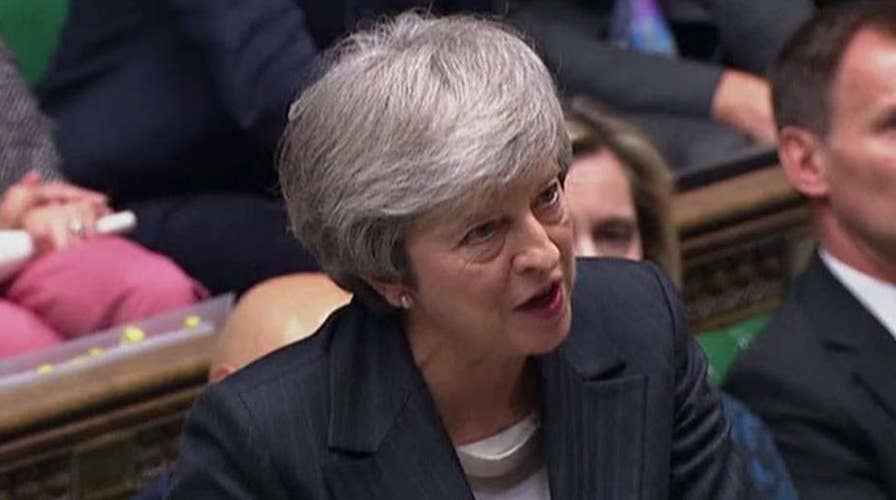Theresa May postpones Brexit vote
Prime minister to address Parliament after delaying the final vote on her Brexit deal; Kitty Logan reports from London on the details.
British Prime Minister Theresa May on Monday delayed a vote in Parliament to approve her controversial Brexit deal, a move that presents an uncertain path ahead in Britain's lengthy divorce from the European Union -- and one further imperiling the embattled prime minister's political future.
May's Conservative government does not have a majority in the House of Commons, and opposition parties — as well as dozens of Conservative lawmakers — say they will not back the Brexit deal May and EU leaders agreed upon last month. The vote had been set for Tuesday. It is not clear when it will be rescheduled.
Pro-Brexit lawmakers say the deal keeps Britain bound too closely to the EU, while pro-EU politicians say it erects barriers between the U.K. and its biggest trading partner and leaves many details of the future relationship undecided.
The main sticking point is a "backstop" provision that aims to guarantee an open border between EU member Ireland and the U.K.'s Northern Ireland post-Brexit. The measure would keep Britain under EU customs rules, and is supposed to last until superseded by permanent new trade arrangements. Critics say it could leave Britain tied to the EU indefinitely, unable to strike new trade deals around the world.
Britain voted in 2016 to leave the 28-nation bloc, and invoked Article 50 of the EU's Lisbon Treaty in March 2017, triggering a two-year exit process.
In yet another twist in the Brexit tale, the European Union's top court ruled Monday that Britain can change its mind over Brexit, the Associated Press reported, boosting the hopes of people who want to stay in the EU that the process can be reversed.
The European Court of Justice ruled when an EU member country has notified its intent to leave, "that member state is free to revoke unilaterally that notification."
A group of Scottish legislators had asked the court to rule on whether the U.K. can pull out of the withdrawal procedure on its own. Scotland's Constitutional Relations Secretary Michael Russell described the ruling as "hugely important."
"People in Scotland overwhelmingly voted to remain in the EU," he said. "This judgment exposes as false the idea that the only choice is between a bad deal negotiated by the U.K. government or the disaster of no deal."
But May has repeatedly said the government will not seek to delay or reverse Brexit.
British Environment Secretary Michael Gove, who helped drive the Brexit campaign, also said the court ruling would have no real impact.
"We don't want to stay in the EU...so this case is very well but it doesn't alter the referendum vote or the clear intention of the government that we leave on March 29," Gove told the BBC.
If May's deal is ultimately defeated, Parliament could vote again on a revised version and back it. Or it could coalesce around another Brexit deal that would see Britain retain very close links to the European single market.
A loss also likely means the embattled prime minister will face a leadership challenge.
The Associated Press contributed to this report.







































